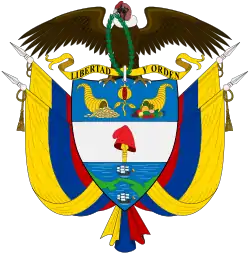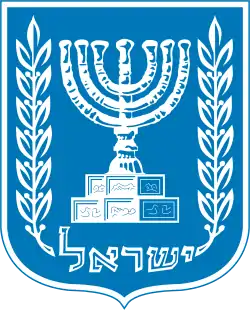Colombia–Israel relations
Colombia–Israel relations are the diplomatic relations between Colombia and Israel which were officially established in the mid-1950s.
 | |
Colombia |
Israel |
|---|---|
History
In 1947, during a United Nations General Assembly session, General Assembly Resolution 181 recommended the partition of British Mandate Palestine into one Jewish and one Arab state. Colombia abstained.[1]
In the mid-1950s both countries officially established diplomatic relations and set up embassies in Bogotá and Tel Aviv respectively.[2] Relations improved tremendously in 1988 when major trade agreements were signed between Israel and Colombia. A Free Trade agreement was signed on 10 June 2013. However, it has not yet been ratified by Colombia and therefore is not yet in force.[3] This agreement reduces tariffs on industrial and agricultural products between the two countries, and enable Israeli companies and individuals to invest with greater ease in the Colombia economy, considered to be second biggest economy of South America. Israeli exports to Colombia totaled some US$143 million in 2012, and consisted mostly of communications equipment, machinery, electrical and mechanical devices and chemical products.[4]
Colombia also supports the aspiration of the Palestinian people to establish themselves as a free and independent state in the region. Additionally, Israel is Colombia's main partner in the region and is Colombia's second largest trading partner in South America after Brazil. Bilateral relations have deepened through high-level visits in recent history.[5]
On 13 September 2017, Israeli Prime Minister Benjamin Netanyahu paid an official visit to Colombia.[6]
Technological cooperation
Colombia has purchased planes, drones, weapons and intelligence systems from Israel.[7] Until 2018, Colombia was one of the few remaining governments in Latin America that did not recognize Palestine as a state.[8]
Resident diplomatic missions
See also
References
- facts of Israel: United Nations, 1947, Resolution 181 approves the creation of Israel, the Jewish State
- (in Spanish) Israeli embassy in Colombia: Israel and Colombia
- "Archived copy". Archived from the original on 27 August 2016. Retrieved 12 May 2016.CS1 maint: archived copy as title (link)
- "Israel, Colombia sign free trade agreement".
- "| Embajada de Colombia en Israel". Retrieved 31 March 2014.
- Netanyahu arrives in Colombia, looks to help post-conflict efforts
- Colombia hostage rescue: the Israeli angle - Haaretz - Israel News
- "WJC hails Colombia over opposition to Palestinian statehood - World News - Jerusalem Post".
- Embassy of Colombia in Israel
- Embassy of Israel in Colombia
External links

